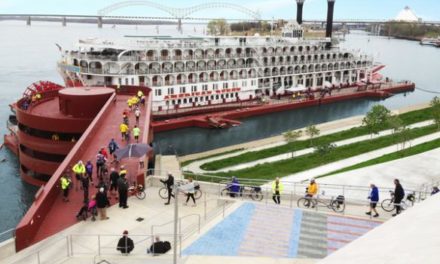From National Journal:
The mayor of Chattanooga wants his city to become the technology hub of the Southeast—even if that’s not the image most Americans would assign to this mid-sized city along the Tennessee River. But surprisingly, Chattanooga boasts some of the fastest Internet speeds in the country. Volkswagen and Amazon opened plants or warehouses here in the past three years, and several small, quirky companies such as Pure Sodaworks, Variable, and Supply Hog have sprung to life, all started by locals.
For Mayor Andy Berke, all of this serves as evidence that Chattanooga can and will recast itself as a home for innovative companies: a place for residents who think beyond the confines of a 9-to-5 job. (The 45-year-old mayor, who’s been in office for just over 100 days, even appointed the city’s first innovation officer.)
National Journal sat down with Berke to talk about Chattanooga’s manufacturing past and its future economy, as well as President Obama’s recent visit to a local Amazon warehouse, where he touted the creation of middle-class jobs. Edited excerpts follow.
I keep hearing from residents and economic-development officials here that Chattanooga is the next tech hub, like a mini-Silicon Valley or Boston.
I’m trying to get away from that. In the past, we’ve called ourselves the ‘Boulder of the South.’ Then, the next Austin. All kinds of comparisons. My mantra has been: Now is our time. Let’s not worry about what others are doing. Let’s be proud of where we are and take advantage of all of our opportunities.
Chattanooga now has some of the fastest Internet speeds in the U.S., because the local utility company installed a fiber-network system throughout the city, but has that actually led to the creation of profitable start-ups, or is this tech economy idea more aspirational?
I don’t want to say it’s mostly aspirational because there are people here doing great work. We have burgeoning industries relying on the tech world here. For that to succeed, part of that, for me, is that we have to think about ourselves as a place where high-tech companies come and grow. The self-conception part really is important. It tells people who may have an idea but that haven’t been in the tech world before: There is a path to get this done. The more success we have, the more we will see ourselves as a connected city.
What do you want the economy here to look like after your first four-year-term?
The South has a significant manufacturing component. The last numbers I saw were that our metro area has roughly 22 percent manufacturing versus a national average that is more like 10 or 11 percent. Because of Volkswagen, that is strength for Chattanooga, and I always believe we should build on our strengths. By the same token, we know that a growing component of jobs will be higher skilled. We need greater college attainment in order to have the jobs of the future. Part of that is also bringing in industries that seek out higher-skilled jobs, and I think the Gig initiative [the high-speed Internet system] is a great way for us to do that.
One other component: Tennessee has in the past been 50th in new-business creation. We actually are 51st, but when you tell people that, they look at you crazy because we’re behind Washington D.C., as well. The entrepreneurship component of our city is critical. We were built on the founding of new businesses, like Coca Cola bottling, Chattem, and Unum. I can see a return to those times, and that will be the next phase to our city.
What about jobs for the low-skilled workers? I can’t tell where they fit into this picture.
Yesterday I was reading a Third Way policy piece that said the average 40-year-old male without a college degree earns 12 percent less today than he did in 1980, adjusted for inflation. This is a problem. So there are two approaches. One is the education piece: We have to have higher attainment. The second part of that is looking for opportunities that will help all areas of our economy. You look at the distribution jobs here which have been growing.
President Obama’s recent trip to Chattanooga to an Amazon warehouse caught some flak nationally because Amazon has been criticized for not paying decent wages to its workers and subjecting them to some poor working conditions. Did you think this criticism of the Chattanooga plant was fair? Are those decent middle-class jobs?
The president came to Amazon to talk about a better bargain for the middle class. The jobs at Amazon are a piece of that puzzle. It’s not the only piece, but Amazon has been a contributor to thousands of people in Chattanooga. We would never look down on that. It’s a growing company; in our current economy, we should treasure that success.
Most tech hubs are based in pretty liberal states, like California or Massachusetts or New York. Do you ever worry that the politics of living in red state would scare off people interested in that kind of work and in the tech economy?
I don’t think so. People make choices for lots of different reasons, one of which is lifestyle. The Chattanooga lifestyle is based less on politics and more on our surrounding—great outdoors, fantastic quality of life, a tremendous friendliness. That, to me, is much more important than any Democrat’s discomfort with being in a red state. I am a Democrat, and I love here. It also hasn’t been a red state forever. In 2006, we had a Democratic governor who won 95 counties. We had Harold Ford. He came within 48,000 votes of being a U.S. senator. That’s seven years ago, so political trends come and they go.



